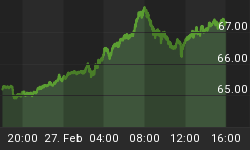Last week, the Fed extended its emergency economic powers, which include lending to the money center banks at zero interest. A few days later, the Fed's plan was reinforced by similar announcements from the rest of the G-20. The road map the authorities are providing for the near-term global economy can't be much clearer. There will be no cessation of the seemingly endless supply of cheap dollars being pumped into the financial system. With the world apparently in complete accord on the need for ever more liquidity, stock markets are staging an easy-money rally. The main line media is almost euphoric. But what should investors make of this seemingly good news?
This time last year, the world faced a meltdown of its financial systems and a potential depression. Fed Chairman Ben Bernanke, a renowned expert on the Great Depression, coordinated an international rescue of the toxic financial system. Although the bill for these operations has yet to come due, almost all agree it will prove costly to present and future generations. For now at least, the most significant impact of these policies has been the creation of a liquidity bubble in stocks and a surge in commodities.
However, any efforts to reduce these stimuli will result in an immediate correction toward our previous depressionary trajectory. Acceptance of this uncomfortable truth is a political third rail. Therefore, it is highly unlikely that any major government will change course. Rather, the change will be thrust upon them.
It could have been argued that some of the actions taken last year were worth the cost if they had corrected the dangerous deficiencies in the financial system. But after a year, what has changed? The same behemoth banks remain, but even larger and yet more demanding of federal salvation. That particular risk has been increased rather than reduced.
Indeed, the four largest banks have been given well over $1 trillion of TARP funds to trade. In addition, with a zero-cost of Fed funds and a positive yield-curve, the banks have been able to generate massive profits without having to incur the risks of lending to the private sector. With such a license to steal, their stock prices have risen dramatically, sending false signals to other market participants of a broader economic recovery. Soon, these burdens to the taxpayer will pay some $140 billion in year-end bonuses. Far from a disaster, it seems as global financial crisis has been a godsend to Wall Street.
The banks also have been allowed to continue manipulating accounting rules to hide their toxic assets, including their multi-trillion-dollar exposures to the murky derivatives market. In addition, the banks continue to face escalating loan, mortgage, and credit card defaults, and an impending crunch in the commercial real estate market.
Despite popular impressions, it is clear that the bailed-out banks still face trouble. Indeed, they face enough trouble to potentially threaten the whole system again.
Could this be the reason that, despite its cautious optimism on the economy, the Fed is intent on maintaining an open source of free money for the banks? If the Fed's public optimism were to be believed, then why is there a need to continue the "emergency" TARP, bank subsidies, and economic stimulus? Could it be that the Fed is still fearful of a second financial panic? More importantly, will this fear lead to limitless liquidity - even at the cost of the value of the dollar?
The Fed's laxity would be contained somewhat if the Washington had its fiscal house in order. Unfortunately, with an official projected national debt of $20 trillion by 2015, the Administration is in no position to push for a strong dollar. Nor has Mr. Obama shown any interest in reining in the debt, instead occupying himself with a generous new healthcare entitlement. If the debt cannot be brought under control, a higher interest rate will push the U.S. government toward outright default.
This toxic cocktail of fiscal and monetary constraints on the U.S. dollar may be what prompted India to buy some 200 metric tons of gold from the IMF, China to hoard a large part of its own massive gold production, and other government parties to the shady Central Bank Gold Agreement to lose enthusiasm for selling their gold.
In a recession, gold should be falling in price. But with a Fed Chairman who seems unwilling to hit the brakes even as we head for a cliff, and an Administration that doesn't seem to care, creditor nations are jumping off the dollar train for a terra firma made of money metals. Wise investors should follow their lead.
For a more in-depth analysis of our financial problems and the inherent dangers they pose for the U.S. economy and U.S. dollar, read Peter Schiff's 2008 bestseller "The Little Book of Bull Moves in Bear Markets" and his newest release "Crash Proof 2.0: How to Profit from the Economic Collapse." Click here to learn more.
More importantly, don't let the great deals pass you by. Get an inside view of Peter's playbook with his new Special Report, "Peter Schiff's Five Favorite Investment Choices for the Next Five Years." Click here to dowload the report for free. You can find more free services for global investors, and learn about the Euro Pacific advantage, at www.europac.net.















